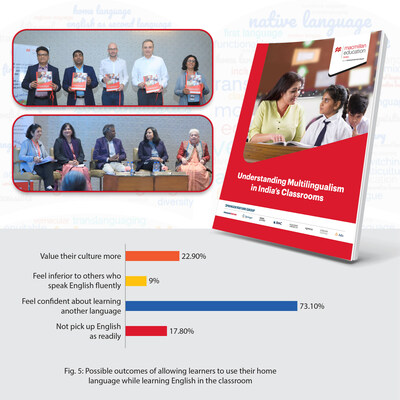NEW DELHI, Feb. 7, 2023 /PRNewswire/ — The beauty of educational institutions lies in their heterogeneity – when one steps into a school or college campus, they overhear conversations in multiple languages. If this is the scene on the campus, why then the insistence on learning only in English in the classroom?
With NEP 2020 focusing on use of home language in the classroom, Macmillan Education India undertook a survey to build understanding of and support implementation of multilingualism. As part of the study, the company reached out to a thousand practising teachers, to explore the understanding and need for multilingualism in classrooms.
The study aims to understand the perceptions of teachers on multilingualism and its significance in Indian classrooms in the coming times. Findings concerning the participating teachers' understanding and support of the actual concept of multilingualism, its impact and effectiveness varied.
The study identified the following:
- While the participants perceive multilingualism differently, they all welcome the use of more than one language in their classes
- Use of home language can support the understanding of academic concepts
- Usage of multiple languages in the classroom encourages diversity and inclusion
The report on 'Multilingualism in India's Classrooms' was released by Mr. Biswajit Saha, Director Training & Skilling, Central Board of Secondary Education, Mr. Frank Vrancken Peeters, Chief Executive Officer, Springer Nature Group, Mr. Joachim Krieger, Managing Director, Professional and Education, Springer Nature and Mr. Rajesh Pasari, Managing Director, Macmillan Education India and Vandana Juneja, Director, Marketing, Macmillan Education India at an event held in Delhi.
Addressing a gathering of educators, Mr. Frank Vrancken Peeters spoke on the Group's emphasis on research to advance learning and opening doors to discovery. He said, “Springer Nature is committed to publishing trusted research. This report supports the development of a new idea which could positively influence learning outcomes and play a part in offering a solution to the practical challenge of teaching in linguistically diverse classrooms.”
When participants were asked the question 'Does student learning improve when you switch between languages during classroom instruction?'
For a majority of teachers the answer was a big 'Yes' for Teaching English with code switching. Based on broad-spectrum observations, given the multilingual nature of India, there is always a general tendency among teachers in both ELT and other classes to code-switch for some reason or another. Said a teacher, “Language switching helps English learners better understand concepts, especially cultural ideas. The phrase 'Child's play' was used in a poem which they understood clearly when a learner shouted 'Bachon ka Khel'.”
The survey showcased possible outcomes of allowing students to use their home language while learning English in the classroom
Highlighting the significance of the survey report Mr Rajesh Pasari said, “The report documents the multilingual reality and various teaching practices in classes of English language as well as other subjects all over India. It analyses the potential advantages and challenges of linguistic diversity which can impact the learning of Indian learners in educational institutions.”
At a panel discussion held at the event, panellists Prof. Rama Meghanathan, Professor of English, NCERT, Prof. Deepti Gupta, Professor of English, Panjab University and Radhika Gholkar, Head—Academic English, The British Council and Ms Kadambari Lohiya, mentor teacher, Directorate of Education, Delhi all agreed that the multilingual nature of the Indian classroom, must be used as a resource, so that every child feels secure and accepted.
It is a report which will assist Indian teachers to move confidently ahead with deep respect for their mother tongue and improve learning outcomes by allowing mother tongue in the classroom for higher confidence and conceptual understanding of students.
(Disclaimer: The above press release comes to you under an arrangement with PRNewswire India and this publication takes no editorial responsibility for the same)

